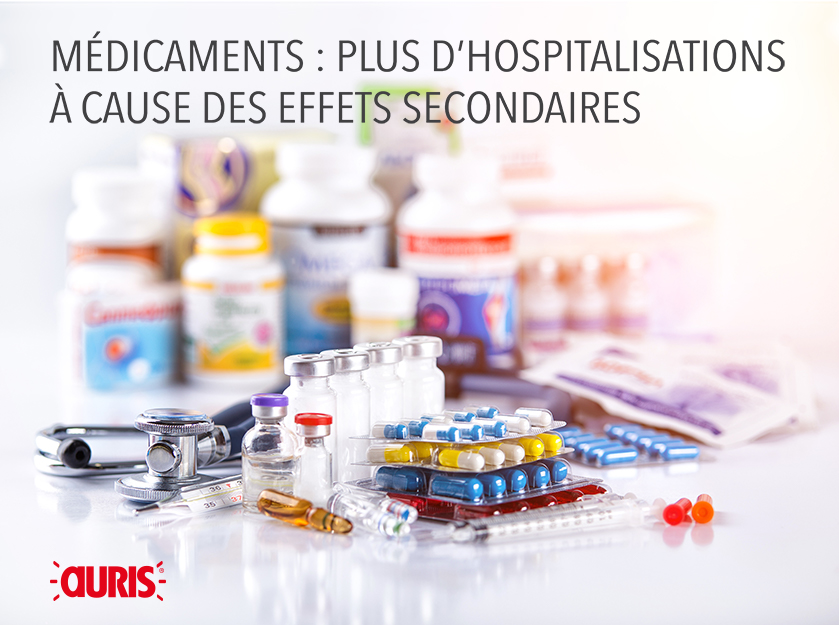Medicines: sharp rise in hospital admissions for adverse effects
In ten years, the number of hospital admissions due to the side effects of drugs has risen by 47% in France.
Medicines provide treatment, but they can sometimes be difficult for the body to tolerate: these are known as undesirable effects or side-effects.
According to an article in Le Figaro on Monday 30 May, these serious side effects are on the increase. In 2018, 212,500 people were hospitalised because of side effects, compared with 144,000 in 2007. A comparison of the results for these two periods shows a significant increase in hospitalisations linked to adverse drug reactions.
Scientists do not know the causes: "This is a trend that has also been observed in other countries, but we have no clear explanation", explains Pr Marie-Laure Laroche, pharmacologist at the regional pharmacovigilance centre (CRPV).
One possible explanation could be the sometimes inappropriate use of treatments. In fact, the data collected indicates that 16% of adverse reactions could have been avoided by better monitoring of the doses, duration and precautions for use of these drugs. Professor Dominique Deplanque, President of the French Society of Pharmacology and Therapeutics, stresses the need to follow these recommendations for the elderly: "In the case of the elderly, we need to pay particular attention to the appropriateness of the treatment and the risks each time we add a drug to a prescription", he explains to Le Figaro. For some doctors, we need to go even further and introduce sobriety in the use of medication. For Professor Rémy Boussageon, Chairman of the Scientific Council of the Collège national des généralistes enseignants (CNGE), prescriptions could be limited to "five drugs per prescription".
Another approach would be to provide much clearer and more legible leaflets in medicine boxes, particularly on adverse effects.

What foods can help with constipation?
If, like one in two women, you suffer from constipation, you'd like to put an end to this transit problem that bothers you on a daily basis.
Changing your eating habits could be the solution.
Here are the foods to try:
- Fruit: kiwis, prunes, apples, plums, passion fruit, raspberries, blackberries, redcurrants, guavas, grapes and oranges...
- Vegetables: leeks, celery, fennel, green beans, lettuce, peas, cabbage, turnips, artichokes, salsify, konjac, etc.
- Dried vegetables: lentils, white or kidney beans, chickpeas, etc.
But the most important thing is to drink 1 litre to 1.5 litres a day. While coffee, tea and fizzy drinks should be avoided, mineral waters such as Hépar, Courmayeur or Contrex speed up intestinal transit thanks to the laxative effect of magnesium. Drinking small quantities throughout the day will ensure optimum hydration.
And of course, if you magnetise your drink, you'll modify its structure to make it even more hydrating, with visible effects on the skin. Physical activity also stimulates intestinal transit, particularly when abdominal muscles are involved. If possible, take a short digestive walk after meals.

An egg a day to avoid heart problems?
Eggs are often blamed for their cholesterol content. But according to a recent study, these sources of protein are good for heart health. In eLife, the authors explain that moderate consumption increases the quantity of heart-healthy metabolites: these are the products of the digestion of this food.
In 2018, a study published in the journal Heart, based on data from around half a million adults in China, already addressed this issue. It showed that those who ate eggs daily (around one egg a day) had a significantly lower risk of heart disease and stroke, compared with those who ate them less frequently.
To better understand the links between egg consumption and heart health, scientists from Peking University in Beijing conducted this new research.
Their analyses revealed that people who ate moderate amounts of eggs had higher levels of a protein in their blood called apolipoprotein A1, a constituent of high-density lipoprotein (HDL), also known as "good lipoprotein", and had more HDL molecules in their blood, which help to eliminate cholesterol from blood vessels. In addition, they found that participants who ate fewer eggs had lower levels of beneficial metabolites and higher levels of harmful metabolites in their blood. "Our results provide a potential explanation for how eating moderate amounts of eggs may help protect against heart disease," concludes Canqing Yu, co-author of the study.
Don't forget that eating at least one egg a day is the secret of centenarians!

For a good night's sleep, should you sleep with someone else?
Sharing a bed means taking the risk of being woken up in the middle of the night. So is sleeping together really bad for your quality of sleep? A study has taken a serious look at the question! Some couples sleep in separate bedrooms because the other person snores, doesn't get up at the same time, gets up in the middle of the night... there are many reasons for this. You might think that sleeping alone means you won't be disturbed while you sleep. But what is really the case?
A team of researchers looked at 1,007 adult volunteers living in Pennsylvania (USA). They used two sets of data. The first concerned bed-sharing. They asked the adults to indicate how they had slept over the past month.
Contrary to what you might think, adults who slept in pairs most of the time reported sleeping longer, feeling less tired and experiencing less insomnia. The risk of sleep apnoea was also reduced in this population. Adults who slept alone, on the other hand, tended to have more insomnia.
Sleeping with a partner was associated with lower scores for depression, anxiety and stress. As well as higher relationship satisfaction.
The researchers therefore conclude that sleeping with someone promotes better sleep quality and better mental health.
For a good night's sleep, think about your environment too. The Actipol sleep set places your bed in an ideal magnetic axis, a result confirmed by a clinical study.

An anti-cancer agent in sea corals...
25 years of research - that's how long it took scientists to find the source of a natural chemical that had shown promise in early studies of cancer treatment.
Now they have found it, and not just anywhere: on the seabed, in soft corals, which have been found to harbour exceptional therapeutic products.
According to the study published in Nature Chemical Biology, identifying the source enabled the researchers to go further and find the animal's DNA code to synthesise the chemical and carry out the first steps in reproducing the soft coral chemical in the laboratory.
In fact, soft corals possess thousands of drug-like compounds that could be used as anti-inflammatory agents, antibiotics and others, but they also contain a chemical substance: eleutherobin, with anti-cancer properties. A powerful compound that inhibits the growth of cancer cells.
Eleutherobin therefore represents hope for patients and researchers alike. Researchers will now be looking at how this potential drug can be developed and, above all, how sufficient quantities can be produced.

